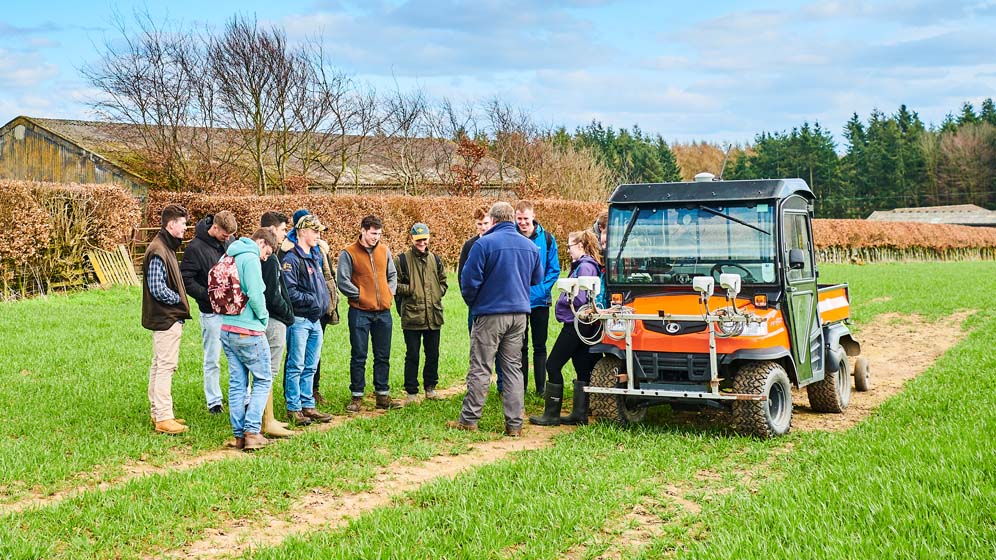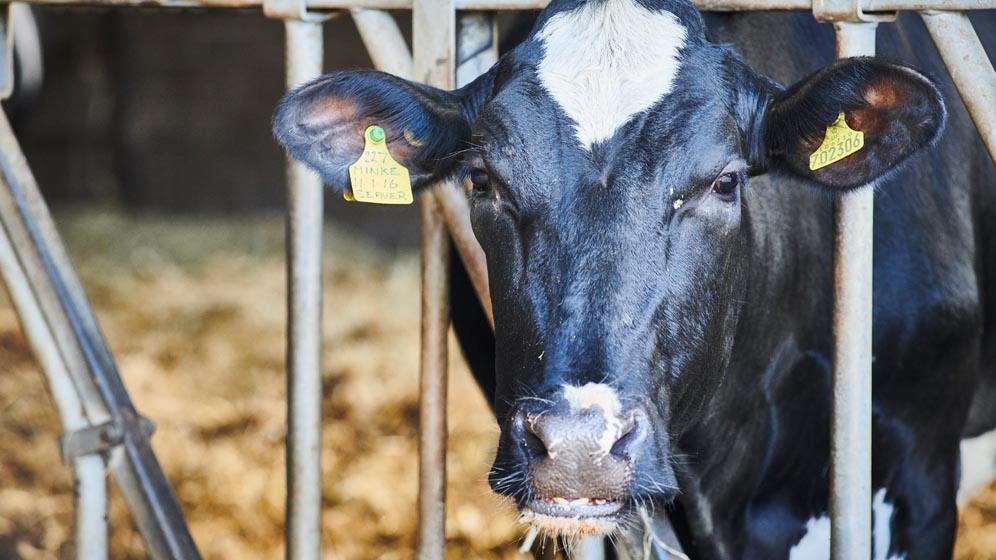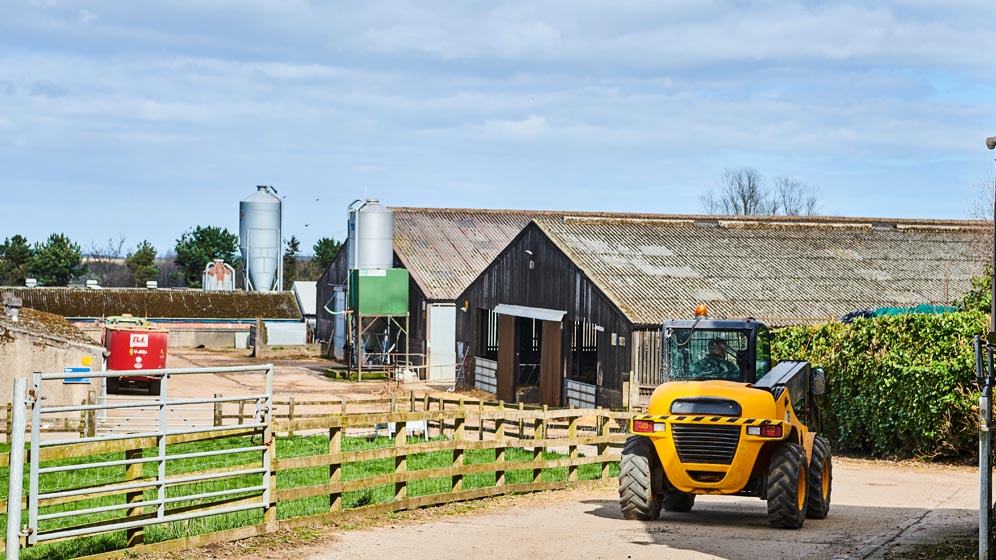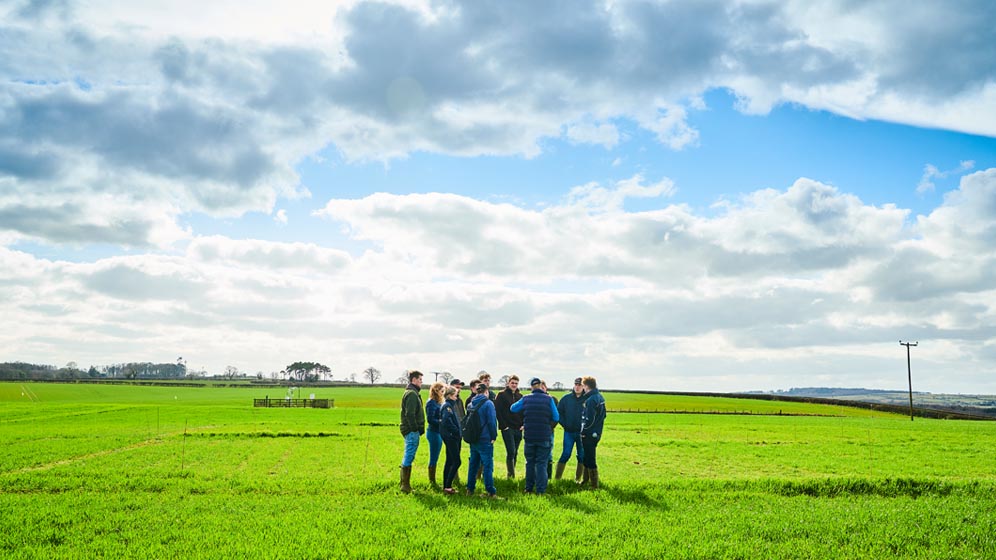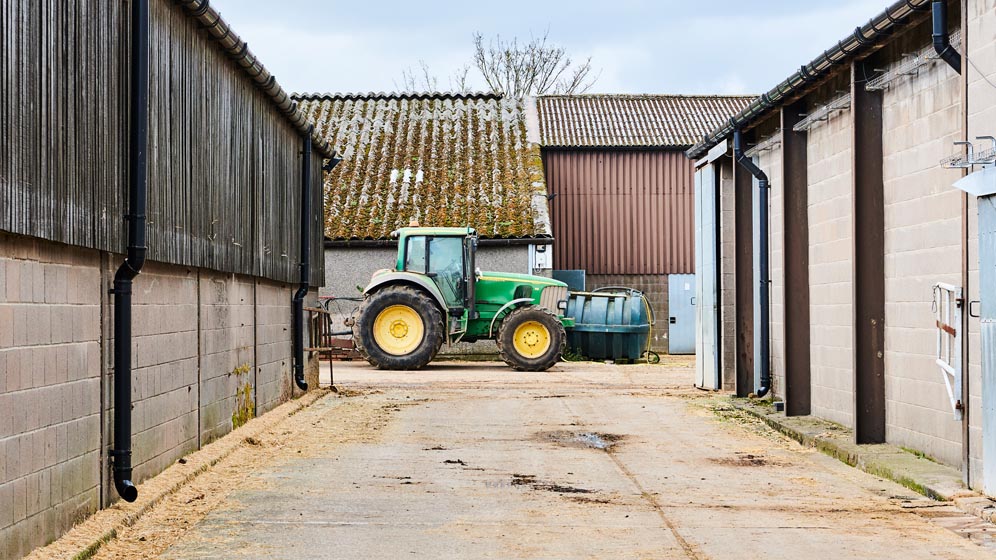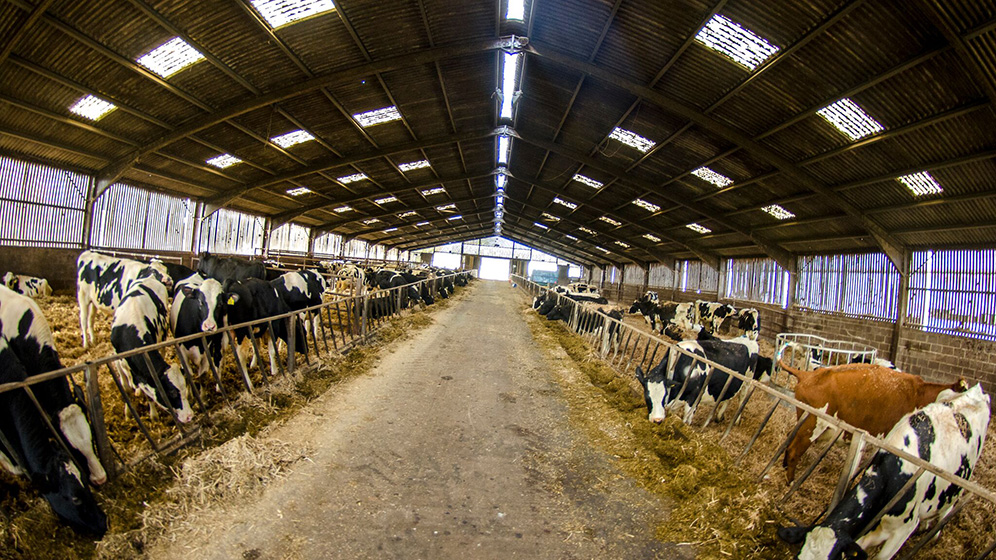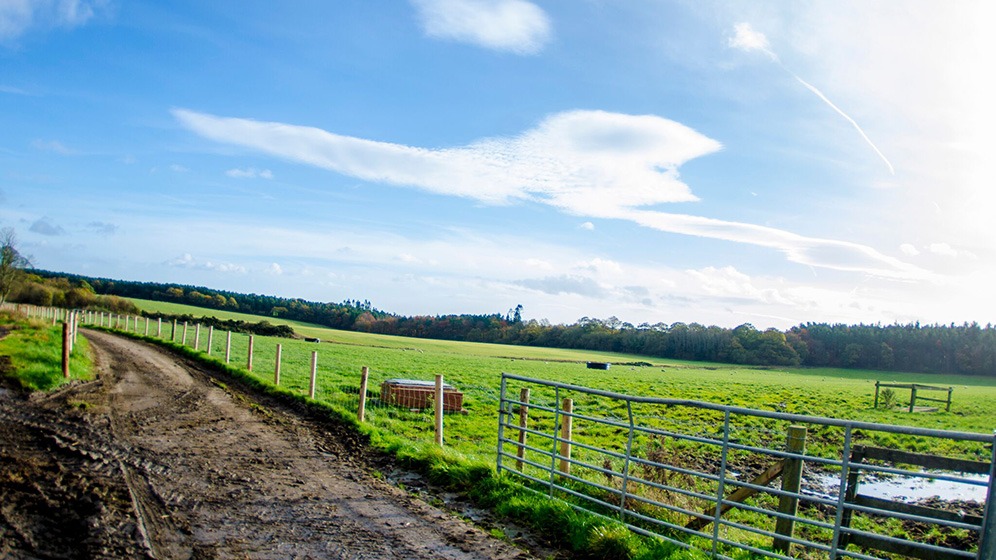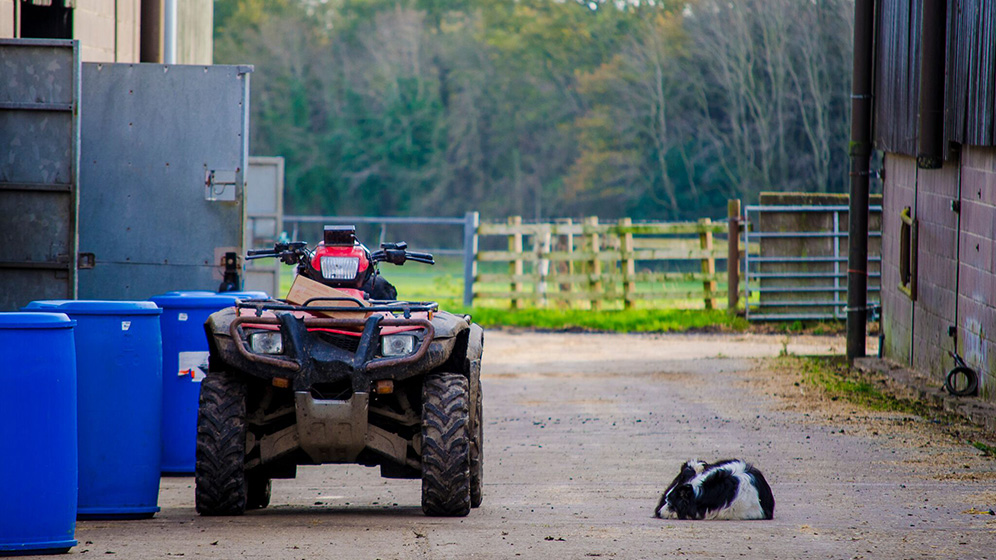Agriculture with Farm Business Management BSc Honours
- UCAS code: D402
- Full time
- 3 years
This degree focuses on the management of each element of an agricultural business: the whole estate; the farm; and individual arable, livestock and diversified enterprises.
You are currently viewing course information for entry year: 2026
Next start date:
- September 2026
UCAS Institution name and code:
- NEWC / N21
Course overview
Our farm business management degree equips you with the specialist knowledge and skills to enter a range of professions in this complex, high tech and rapidly changing sector.
Our degree combines elements of science with a focus on practice, business acumen, research and policy.
You are taught alongside students on the agriculture and agri-business management degrees. You have a choice of optional multi-disciplinary modules. These enable you to pursue your interests to align with your strengths, passion and future aspirations.
You can progress to managing and developing your own farm enterprises or important roles within the supply chain and consultancy sector.
Your course and study experience - disclaimers and terms and conditions
Please rest assured we make all reasonable efforts to provide you with the programmes, services and facilities described. However, it may be necessary to make changes due to significant disruption, for example in response to Covid-19.
View our Academic experience page, which gives information about your Newcastle University study experience for the academic year 2025-26.
See our terms and conditions and student complaints information, which gives details of circumstances that may lead to changes to programmes, modules or University services.
Quality and ranking
Professional accreditation and recognition
All professional accreditations are reviewed regularly by their professional body.
Modules and learning
Modules
The information below is intended to provide an example of what you will study.
Most degrees are divided into stages. Each stage lasts for one academic year, and you'll complete modules totalling 120 credits by the end of each stage.
Our teaching is informed by research. Course content may change periodically to reflect developments in the discipline, the requirements of external bodies and partners, and student feedback.
Optional module availability
Student demand for optional modules may affect availability.
Full details of the modules on offer will be published through the Programme Regulations and Specifications ahead of each academic year. This usually happens in May.
To find out more please see our terms and conditions
You'll study crop health, animal health, agri-supply chains, agri-business economics and sustainability.
We’ll also introduce you to lab work and IT applications. You’ll use these skills to apply statistical techniques to understand and capitalise on information from agricultural data.
Your visits to our commercial farms with their cutting edge field trials and research enable you to apply and extend your knowledge.
Modules
| Compulsory Modules | Credits |
|---|---|
| Crop Health | 10 |
| Introduction to Business Management | 10 |
| Agri-Food Supply Chains | 10 |
| Animal Health | 10 |
| Sustainability in Practice | 20 |
| Introductory Business Economics | 10 |
| Academic and Professional Skills | 20 |
| Introduction to Sustainability | 20 |
| Plants, Environment, Agriculture | 10 |
Apply your knowledge to animal and crop husbandry and farm management. We’ll study animal breeding, arable crop production and agricultural markets.
A consultancy style 'Dragon's Den pitch' type module is an exciting group project where commercial sponsors pose a sustainability challenges for a team of multidisciplinary students to devise solutions.
We’ll continue to visit farms and other enterprises, so you can put your learning into practice.
Modules
You will explore management techniques used for decision-making in agricultural businesses. Your core modules will develop your skills in farm planning, land law, budgeting and accounting.
You’ll also produce a dissertation on a farm business management topic of your choice. Projects and case studies will form a major component of your management modules. There are workshops and demonstrations of software used in planning and control.
Modules
| Compulsory Modules | Credits |
|---|---|
| Law and Land Use | 10 |
| Farm Business Consultancy | 20 |
| Applied Farm Business Management | 20 |
| Dissertation | 30 |
We base these figures and graphs on the most up-to-date information available to us. They are based on the modules chosen by our students in 2024-25.
Teaching time is made up of:
- scheduled learning and teaching activities. These are timetabled activities with a member of staff present.
- structured guided learning. These are activities developed by staff to support engagement with module learning. Students or groups of students undertake these activities without direct staff participation or supervision
Teaching and assessment
Teaching methods
In our teaching, we’ll use a variety of different methods, including:
- lectures
- laboratory practicals
- farm and industry visits
- project work
- reports
- consultancy challenges
- expert guest speakers
- virtual learning environment
In your lectures, seminars and laboratory practicals, you’ll learn about the science and theories behind agriculture and business practices.
We’ll visit the University farms and other local farming businesses. These help you apply your knowledge and understand a range of alternative approaches and practices under different business, policy and environmental conditions.
Assessment methods
You'll be assessed through a combination of:
-
Assessments
-
Assignments – written or fieldwork
-
Dissertation or research project
-
Essays
-
Examinations – practical or online
-
Group work
-
Practical sessions
-
Projects
Skills and experience
Practical skills
Academic and practical skills will be gained through modules. Further opportunities exist in areas of personal interest.
Our farm scheme is a way to gain practical experience in our many commercial enterprises and research platforms. This spans resilient and regenerative farming; novel crops and inputs; high welfare and precision practices; robotics and automation; digital and molecular ‘smart surveillance’ for biodiversity, soil, crop, emissions and livestock monitoring; and agri-food system governance and safety.
Our travel fund allows students to apply to attend events of personal interest. These include networking or policy insights at the Institute for Agricultural Management Conference or Northern Farming Conference.
Business skills
Between stages 2 and 3, you can do an optional work placement. This is a great opportunity to get hands-on experience.
If you don't want to do a work placement, you can explore a different country with our Study Abroad Scheme.
Research skills
Agriculture is uniquely positioned to produce food and energy while building natural capital and holds many solutions to global challenges posed by climate change.
Research at Newcastle University is working to find solutions to world problems.
Our 18 experimental farm ‘platforms’ focus on strategically important topics. These include designing production practices to build natural capital and maximise soil, crop and ecosystem services, and sustainable grazing management and in-field phenotyping of arable and biomass crops. Many of these platforms are of national and international importance. For example, our Hydrologically Isolated Plots and Palace Leas Hay Meadow. You will learn about these projects and develop the skills to undertake your own research project.
Recent student dissertations include:
- Using Field Maps to Optimise the Selection and Placement of Environmental Management Options
- Diversification options and analysis for a home farm
- How can vertical farming overcome its high energy costs whilst increasing outputs to become a viable sustainable solution for food production
- Could integrating livestock revitalize arable farming?
- Monitoring of Potato Blight Using UAVs and Machine Learning
- Alternative fuel sources for tractors in a carbon zero production systemAlternative packaging materials for use with potatoes
Opportunities
Study abroad
Gain a global perspective, enhance your academic profile and open doors to exciting new experiences by studying abroad for one semester or a full academic year at one of our partner universities overseas. Study abroad usually takes place in stage 3 of your studies and extends your degree by one year.
You'll have the choice to study at a leading international university, including:
- Monash University
- University of Hong Kong
- University of Pittsburgh
You can also opt for short-term global opportunities like summer schools, virtual exchanges or internships that usually take place over the summer months.
Work placement
During your degree you can apply to spend 9 to 12 months on a professional industrial placement, in the UK or abroad. Your work placement is a great opportunity to gain practical experience, acquire key business skills and make industry contacts. You’ll get University support from our dedicated team. Work placements usually take place between Stages 2 and 3 and extend your degree by a year.
Recent Agriculture and Animal Science industrial placements include:
- Agricultural Graduate Sales Trainee with Davidsons Animal Feeds
- Agronomist at Marks and Spencers
- Ruminant Technical Adviser at Carr's Billington
- Placement student at OSI Food Solutions UK
- Placement student at For Farmers
- Placement student at Oaklands Farm Eggs Ltd
Facilities and environment
Facilities
The Agriculture Building is the home of Agriculture and Animal Science, based in the School of Natural and Environmental Sciences, and located on our vibrant, city-centre campus. Here some of our state-of-the-art facilities include laboratories, plant growth incubators and vertical farming units.
During your studies, you'll have access to Newcastle University Farms. NU Farms encompasses mixed animal, arable and biomass operations, with a commercial dairy and beef herd and a planned bed-and-breakfast pig enterprise. The farms are used for commercial, teaching and research purposes where you develop skills relating to data gathering and analysis, soil sampling, animal and plant health, pests and weed identification. At NU Farms we promote innovation to shape policy and support scientific research. We have extensive collaborations including:
- UK Agri-Tech Centre with on-site facilities
- Fera Science (Fera)
- Institute of Agri-Food and Rural Innovation (IAFRI)
- Linking Environment and Farming (LEAF)
With a focus on sustainability, input from industry and research-driven teaching led by top academics we will prepare you for a successful career in agriculture, animal science and related fields.
We have extensive links with other farms, businesses and animal enterprises to broaden and deepen your understanding.
Animal Science students will also be interested in the high tech gait lab; our laboratories for dissections, microscope work etc and the UK's first our mobile dog behaviour research pod.
Support
We take your health and wellbeing seriously and are committed to supporting you throughout your studies so you can fulfil your potential at university. This support includes:
- your degree welcome event where, in small groups, you get to know those on your course
- a personal tutor who is an academic member of staff who can help you with academic and personal issues throughout your degree
- a peer mentor scheme which pairs you with a current student from your course to help you navigate your first year at university
- a staff-student committee, to give you an opportunity to have a say in how your degree works
- support, treatment and guidance on mental and physical health from our wellbeing team
Your future
As a Newcastle University agriculture graduate, you will be held in high regard in the industry and have many career options open to you.
Many of our graduates have found employment in prestigious national and multinational companies such as:
- Velcourt
- Sentry Farming
- Bidwells
- Andersons
- Strutt and Parker
- Agrovista
- Syngenta
Sustainable solutions
Sorry, you need JavaScript to view this video
The Sustainable Solutions module at Newcastle University offers you the opportunity to collaborate with industry professionals on projects that address real-world sustainability challenges. This hands-on experience enhances your problem-solving skills and prepares you for successful careers in sustainability-focused roles.
You'll have many opportunities to interact with industry through:
- guest speakers
- visits
- industry networking events
- opportunities to attend conferences
Careers support
Our Careers Service is one of the largest and best in the country, and we have strong links with employers. We provide an extensive range of opportunities to all students through our ncl+ initiative.
Visit our Careers Service website
Recognition of professional qualifications outside of the UK
If you’re studying an accredited degree and thinking about working in Europe after you graduate, the best place to find current information is the UK Government’s guidance on recognition of UK professional qualifications in EU member states. This official resource explains whether your profession is regulated in another country, what steps you need to take, and which organisation you should contact.
Entry requirements
All candidates are considered on an individual basis and we accept a broad range of qualifications.
The entrance requirements and offers below apply to 2026 entry.
| A-Level | |
|---|---|
| International Baccalaureate | |
|---|---|
Other UK and the Republic of Ireland qualifications
Alternative offers at Newcastle
Through one of our contextual or alternative offer routes, you could receive an offer of up to three grades lower than the typical requirements.
Contextual offers
We use certain contextual data from your UCAS form, alongside your application, to consider challenges that you may have faced in your education and the potential effect this may have had on your qualifications. This means you may be eligible to receive a lower contextual offer.
PARTNERS offers
One of the largest and longest support entry routes to university of its kind for students from underrepresented backgrounds. We support applicants from application through to study.
Realising Opportunities offers
A unique programme delivered in collaboration with 10 leading, research-intensive universities in the UK. The programme is open to students in Year 12/first year of college.
Pathways to Newcastle offers
Pathways to Newcastle, our national skills entry route, is available for specific subject areas.
High Performance Athletes
We support promising athletes at the application stage, who compete in regional, national or international levels in their sport.
Qualifications from outside the UK
English Language requirements
Entrance courses (INTO)
International Pathway courses are specialist programmes designed for international students who want to study in the UK. We provide a range of study options for international students in partnership with INTO.
These courses are specifically designed for international students who want to study in the UK and progress onto one of our undergraduate degrees. Our International Study Centre, has a range of study options including:
- International Foundation
- International Year One
- English Language courses
Find out more about International Pathway courses
Admissions policy
This policy applies to all undergraduate and postgraduate admissions at Newcastle University. It is intended to provide information about our admissions policies and procedures to applicants and potential applicants, to their advisors and family members, and to staff of the University.
University Admissions Policy and related policies and procedures
Credit transfer and Recognition of Prior Learning
Recognition of Prior Learning (RPL) can allow you to convert existing relevant university-level knowledge, skills and experience into credits towards a qualification. Find out more about the RPL policy which may apply to this course.
Tuition fees and scholarships
Tuition fees for academic year 2026-2027
The 2026 entry home fees have not yet been confirmed.
| Qualification: BSc Honours | |
|---|---|
|
Home students full time 3 years |
Tuition fees (Year 1)
Not set |
|
International students full time 3 years |
Tuition fees (Year 1)
31,500 |
Year abroad and additional costs
For programmes where you can spend a year on a work placement or studying abroad, you will receive a significant fee reduction for that year.
Some of our degrees involve additional costs which are not covered by your tuition fees.
Scholarships
Find out more about:
Open days and events
You'll have a number of opportunities to meet us throughout the year at our on-campus and virtual open days.
You'll be able to:
- explore our beautiful campus
- find out about our vibrant city
- discover what students think about studying at Newcastle
You'll also have the opportunity to speak to academic staff and find out more about the subjects you're interested in.
Find out about how you can visit Newcastle in person and virtually.
We regularly travel overseas to meet with students interested in studying at Newcastle University. Visit our events calendar to find out when we're visiting your region.
How to apply
Apply through UCAS
To apply for undergraduate study at Newcastle University, you must use the online application system managed by the Universities and Colleges Admissions Service (UCAS). All UK schools and colleges, and a small number of EU and international establishments, are registered with UCAS. You will need:
- the UCAS name and institution codes for Newcastle University (NEWC/N21)
- the UCAS code for the course you want to apply for
- the UCAS 'buzzword' for your school or college
If you are applying independently, or are applying from a school or college which is not registered to manage applications, you will still use the Apply system. You will not need a buzzword.
Apply through UCASApply through an agent
International students often apply to us through an agent. Have a look at our recommended agents and get in touch with them.
Get in touch
By phone
Call us on +44 (0) 191 208 3333 and press option 1. Our opening hours are Monday to Friday 10am until 4pm.
Live chat
Our NCL chatbot might be able to give you an answer straight away. If not, it’ll direct you to someone who can help.
You'll find our NCL chatbot in the bottom right of this page.
Online
Chat to our students
Choosing a university is a big decision. If you've got questions about a particular course, student life or the city of Newcastle, why not chat to our friendly students or graduates!
Book a one-to-one chat
Book a slot with one of our academic staff for a one-to-one chat about your subject of interest, student experience, and more: Book now
Keep updated
We regularly send email updates and extra information about the University.
Receive regular updates by email




